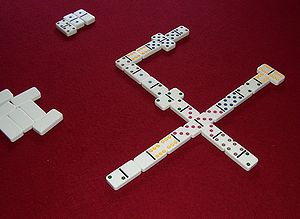- Muggins
-
Muggins (also known as All Fives, Five Up, or Doer Di) is a domino game played with any of the commonly available sets. The object of the game is for each player to rid their hand of dominoes, and additionally to score points by playing a domino (or bone) that makes the total number of pips on all endpoints of the board equal to a multiple of five.
According to John McLeod of Pagat.com, the name of the game differs according to how many "spinners" are in play. These are doubles that can be built from in all four directions. Muggins is the name of the game played without a spinner, All Fives has a single spinner, and in Five Up, all doubles are spinners.[1]
Contents
Scoring
Points are earned when a player plays a domino with the result that the count (the sum of all open ends) is a multiple of five. The points earned are equal to the sum of the ends.[2] Therefore, if in the course of play a player plays a bone that makes the sum of the ends 5, 10, 15 or 20, the player scores that number. All pips on a crosswise double are included in the count.
Game play
Each player takes five dominoes, when playing with four players or more, or seven when playing with two or three. The remaining dominoes are placed to one side forming the "boneyard". The starting play is determined either by who holds the highest double or the highest-value domino; in either case, that domino is played first. If that domino is a 6-4, 5-5, 5-0, 4-1, or 3-2, the initial count is evenly divisible by five and so the player scores. Players in turn then lay a matching domino on one of the endpoints (if the initial tile is a double, players can also play matching dominoes on the double's long side forming four initial endpoints). Each player must play if holding a domino matching an end. A player who cannot match must draw until obtaining a playable domino. Scores for endpoints are called and taken as the play is made.
Doubles: When a double is played, it is laid with its long side against the end of the endpoint domino. Both halves of the double are counted when adding up the sum of the endpoints for scoring purposes. A matching bone can then be played on the double's other long side (the double then is no longer an endpoint), and then on each of the double's ends when that domino is a spinner. When this happens, one or more new endpoints are created and figure into the endpoint total. This generally results in higher scores (with two endpoints, the maximum score on a turn is 20; with four endpoints it becomes 35; with five endpoints, 40).
The player who goes out wins additional points based on the value of dominoes still in other players' hands, which is figured by counting all pips on those dominoes. Each opponent's hand is rounded to the nearest multiple of five; for example, the winner scores 25 for 27 pips in an opponent's hand and 30 for 28 points. These points are summed and awarded to the winner. If all players are blocked, the lightest hand wins, still earning points based on the pips in opponents' hands (often after subtracting the winner's pip count from each hand or from the total).
Variants of Muggins differ on the number of tiles taken initially, the use of double-six, -nine, -twelve or -fifteen sets, whether the initial tile must be a double, whether all four endpoints of the initial double must be played on before further play can commence, and whether tiles can be played off the four corners of the initial double only or off of all subsequent doubles as well.
A common variation is knocking; when a player cannot lay a tile, they have the option to "knock"; this conditionally skips the next player. If the player after the skipped player can score, he must do so, and play then continues as normal. If he cannot, even if he can play, that player knocks and play reverts to the player who knocked first, who must draw until he can find a playable domino, and then the player who would have been skipped is allowed to play. This is common in a partnership form of the game played with four players; a knocking player thus defers to his/her partner who might be able to score. It is considered cheating for one partner to signal the other that he/she should knock.
Variations
All Threes is played in the same manner as Muggins, except that points are earned for multiples of three.
Fives and Threes is similar to Muggins and All Threes, but points are scored for multiples of five and multiples of three at the open ends. Multiples of five and multiples of three are worth one point each. These can be scored in combination, however. If Player A plays the 6-5 and Player B the 6-1, then Player B scores 2 points because 5 and 1 sum to six (two threes). Player A then plays the 1-5 and earns 2 points because 5 and 5 sum to 10 (two fives). If Player B then plays the 5-5 crosswise, Player B scores 8 points, 5 for five threes and 3 for three fives.
Fives and Threes can be played with or without a "sniff". Games are often played to 31, 61, or 121 points using a cribbage board to score.
References
- ^ Rules for All Fives at Pagat.com Retrieved January 28, 2008.
- ^ Rules for Muggins at Pagat.com Retrieved January 28, 2008.
Categories: Domino games
Wikimedia Foundation. 2010.

